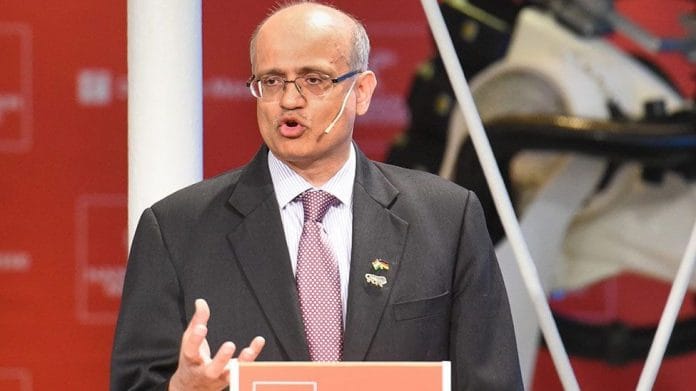New Delhi: India should presume that China negotiates to deceive, said former foreign secretary Vijay Gokhale in an interview to ThePrint Monday.
“Accepting anything at face value, unless it is in a written form and duly signed by both governments, would be extremely dangerous,” said Gokhale, while discussing his book ‘The Long Game: How the Chinese Negotiate with India‘ with ThePrint’s Senior Consulting Editor Jyoti Malhotra.
He made the comment while listing three lessons for New Delhi when negotiating with Beijing.
“Lesson number one is to prepare…the second is we have to presume the Chinese negotiate to deceive…The third point is that there are certain vulnerabilities on the Chinese negotiating position and we don’t have to see them as a ten-foot giant,” he said.
Gokhale also identified Tibet as the central point in India-China relations and referred to Chinese President Xi Jinping’s comments on 1 July during the Chinese Communist Party’s centenary celebrations where he said foreign powers attempting to bully China will have their “heads bashed”.
During the event, Xi had also said: “No one should underestimate the resolve, the will and ability of the Chinese people to defend their national sovereignty and territorial integrity”.
Also read: Unilateral change of LAC status quo ‘not acceptable’, Jaishankar tells Wang Yi in Dushanbe
Nehru’s vision of India-China relations was a ‘blinkered approach’
Explaining the change in India’s diplomatic approach to China over the years, Gokhale began by explaining Prime Minister Jawaharlal Nehru’s vision of China.
“Nehru believed that in overall terms, our principal objective was to develop a friendship with China because India and China would be the two emerging powers to shape a post-World War Asia,” he said. “But the Chinese never saw it that way.”
He added that Nehru’s vision was “wishful thinking”, a “romantic” view of China and a “blinkered approach” but that this was also a time when India lacked diplomatic experience and diplomatic systems were not fully developed.
In reference to current India-China border tensions in Ladakh, Gokhale said India has gained maturity in dealing with the Chinese in terms of understanding their approach and negotiating with them.
“The [Indian] approach now is essentially of holding firm and of preparing to deal with the emergent situation, rather than holding to a strategy that was there earlier and not adjusting to the new reality,” added Gokhale.
Asked about what led to the Galwan Valley clash last year, Gokhale said: “It’s anybody’s guess why they [China] did this…we don’t have any hard evidence.” He added that Beijing’s actions “violated several fundamental agreements” between India and China.
‘India clawed backed its position in Ladakh with a strong reaction’
By strongly reacting to the Chinese, India was able to “claw back” to its position and reiterate the principle that “either both sides respect previous agreements or we are prepared to respond to any provocation”, said the ex-foreign secretary.
This showed how far India has come from the 1950s in handling the Chinese, he added.
Asked why China wants to intimidate fellow Asian nations, Gokhale said: “China wants to enforce the view that they are the dominant Asian power because they are now looking at becoming the dominant global power. Any potential competitors are to be scared away.” He called this a “flawed” strategy.
“The Chinese side tries to play the game of superior and inferior but I think the Indian side doesn’t want to play that game anymore,” said Gokhale, adding that India demonstrated this stance in Eastern Ladakh.
‘Intimidation is a weapon of Chinese diplomatic arsenal’
“Intimidation is a weapon of the Chinese diplomatic arsenal, whether it is with the Philippines in the South China Sea or with Australia on the trade embargo or South Korea over the deployment of the theatre high altitude defence system that the US placed,” he added.
China has long opposed its objection to the presence of the Terminal High Altitude Area Defense (THAAD), an American anti-ballistic missile defense system, that was deployed in South Korea in 2017. THAAD has also been deployed in the UAE, Guam, Israel and Romania.
(Edited by Paramita Ghosh)
Also read: On Afghanistan, China should join India — for a change






